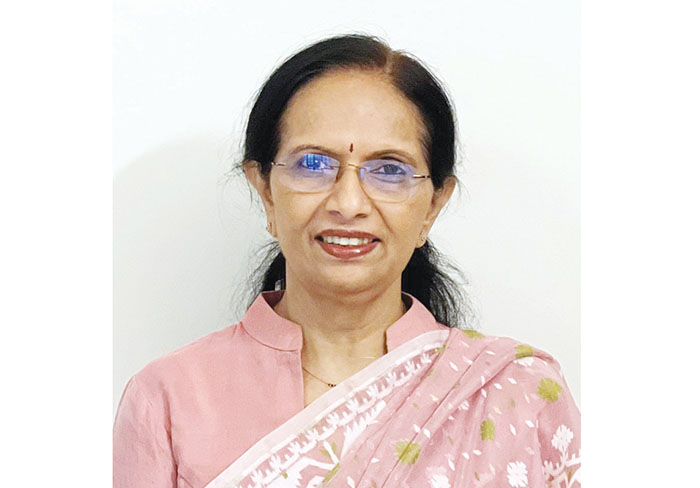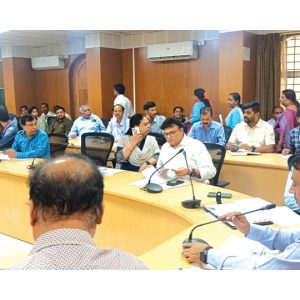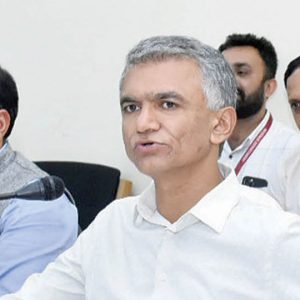Dr. Geeta Patil, Chairperson-2024 of Adolescent Health Academy (AHA) — a Subspeciality Chapter of Indian Academy of Paediatrics (IAP) — and a Senior Consultant Paediatrician, Adolescent Health Care Specialist and Counsellor from Bengaluru, was in Mysuru recently to install the new team of Mysuru Adolescent Health Academy-2024.
Dr. Geeta Patil, trainer for various National IAP Presidential action plans, in her keynote address, spoke about AHA’s vision of ‘Holistic well-being of adolescents’ and its mission of ‘Reaching the Unreached Adolescents.’ Sujata Rajpal spoke to her exclusively for Star of Mysore (SOM), on primary health and mental health issues in adolescents. Excerpts.—Ed
Star of Mysore (SOM): Which are the primary health issues faced by adoles – cents? And what are the preventive measures?
Dr. Geeta Patil: Adolescents constitute 21% of India’s population. Common adolescent health problems include mental health disorders like depression, anxiety, behavioural problems, substance abuse, poor school performance and eating disorders. Common physical health problems are obesity which leads to early hypertension, heart problems, puberty, sexuality issues and sexually transmitted diseases. Due to an immature pre-frontal cortex in adolescence, adolescents are rebellious, argumentative, curious, impulsive and try to seek instant gratification without thinking about consequences.
The word ‘sexuality education’ has many myths and taboos in India. Adolescents get their half-baked knowledge from internet, peers and social media which sometimes results in sexual abuse, pornography addiction, puberty issues. It also leads to adolescent smoking, alcohol consumption and drug addiction.
Investing on health and well-being of this critical age group will result in better demographic dividend. All the caretakers — Paediatricians / adolescent health specialists, parents, teachers, community workers must be empowered to tackle these issues.
Many problems are often rooted in high-risk behaviours, lifestyle, that are diagnosed not with laboratory tests but with detailed careful history, physical examination and counselling.

SOM: What are the mental health issues faced by adolescents?
Dr. Geeta Patil: Globally, one in seven 10-19-year-olds experiences a mental disorder, accounting for 13% of the global burden of disease in this age group. Suicide is the fourth leading cause of death among 15-29 year-olds.
Most adult smokers had their first cigarette prior to the age of 18 years. Cannabis is the most widely used drug among adolescents with about 4.7% of 15-16-years-olds using it at least once. This is more pronounced in our country due to lack of access to information, counselling facilities and services to manage these issues.
Depression and anxiety are mostly rebuffed and considered as growing pains. If left unaddressed, these issues continue in adulthood.
SOM: How far is social media responsible for the mental health issues in adolescents?
Dr. Geeta Patil: According to a recent survey, 8th and 10th grade students spend an average of 3.5 hours per day on social media platforms which is not only a colossal waste of time but the prolonged use of social networking sites lead to depression, anxiety, reduced social skills, disturbed interpersonal relations. The likes and comments give the users a false sense of pride and contentment. Excessive internet usage creates a heightened level of psychological arousal, resulting in sleep deprivation, binge eating and limited physical activity. This also increases the risk of cyber bullying. Internet addiction has increased post COVID because mostly teenagers were spending time online which has continued even later. There are many physical hazards like headache, eyesight problems, fatigue, pain in fingers etc. Emotional problems like FOMO feeling of missing out, restlessness when there is no internet connection (internet addiction). If they do not get enough likes or followers they get into depression.
SOM: How to address mental health disorders in adolescents?
Dr. Geeta Patil: First and foremost is to recognise red flags like loss of interest in most activities, change in appetite, loss of sleep, poor school performance, lying, spending more time in toilets and in solitude. Changing the lifestyle to 5-2-1-0 (five servings of fruits, two hours of online time, one hour of physical activity and zero sugar, sweetened beverages).
Adequate sleep, judicious use of internet and participation in physical activities will help. Paediatricians / adolescent health specialists should pro-actively involve themselves in guiding parents, teachers and community workers. Consulting with psychiatrists, medications, specialised cognitive behavioural therapy will help to manage mental health disorders and can avert many suicides.








Recent Comments